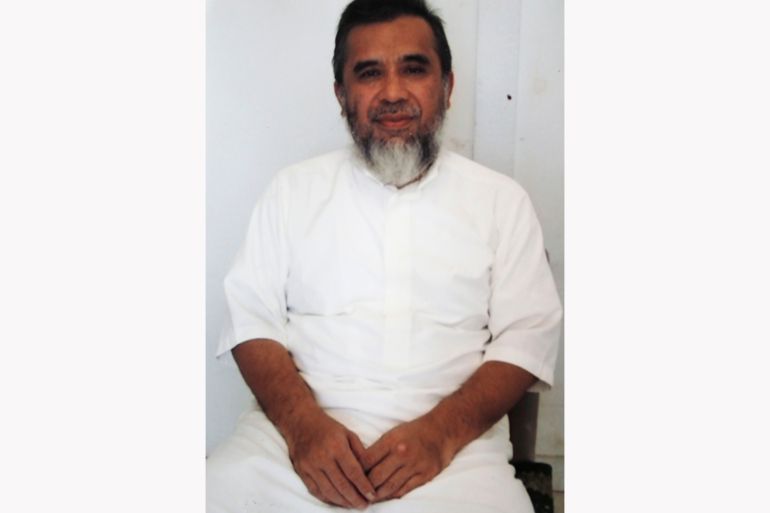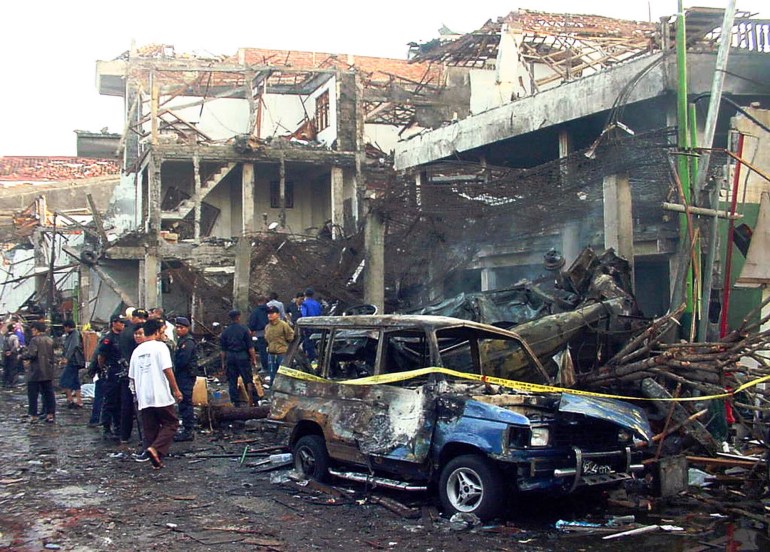Guantanamo detainee due in military court over Indonesia bombings
Former leader of Indonesia’s Jemaah Islamiyah to face war crimes trial, 18 years after his arrest in Thailand.

Medan, Indonesia – An Indonesian man held at a US military prison in Guantanamo Bay, Cuba, is due to go on trial on Monday, 18 years after his arrest in connection with a series of “terror attacks” including the deadly nightclub and hotel bombings in Indonesia in the early 2000s.
Encep Nurjaman, also known as Hambali and Riduan bin Isomudin, is set to face a military commission on charges of war crimes, including murder, “terrorism” and conspiracy.
Keep reading
list of 4 itemsTrump wanted to send COVID-infected Americans to Guantanamo: Book
US approves release of oldest prisoner at Guantanamo: Lawyer
Guantanamo detainee Abu Zubaydah to file complaint with UN agency
Two Malaysian men accused of being accomplices will also stand trial alongside him, namely Mohammed Nazir bin Lep and Mohammed Farik bin Amin.
Some of the charges against the three men relate to the 2002 bombings at nightclubs in Bali and the 2003 attack at the JW Marriott Hotel in Jakarta.
At least 213 people were killed and over 350 others wounded in the bombings.
The al-Qaeda-affiliated Jemaah Islamiyah (JI), of which Hambali was the commander, claimed the attacks.
Described by former US President George W Bush as “one of the world’s most lethal terrorists”, Hambali was arrested during a joint operation by American and Thai forces in northern Thailand in 2003. In addition to allegations of masterminding the bombings in Indonesia, the JI leader was also accused of involvement in a series of foiled plots in Singapore, Australia and the Phillippines, as well as close ties with the late leader of al-Qaeda, Osama bin Laden.

For three years following his arrest, Hambali was held at a secret detention camp run by the Central Intelligence Agency (CIA) and allegedly subjected to torture under the so-called “enhanced interrogation” programme.
The 57-year-old’s lawyers say he was kept nude, deprived of food and sleep, and made to sit and stand in stress positions for long periods of time. They say he was also subjected to a practice known as “walling”, during which interrogators placed a collar around his neck and slammed his head against a wall.
The abuse allegedly continued after Hambali was transferred to the Guantanamo Bay Detention Camp in 2006.
He has been held there since without trial.
Fair trial concerns
Military prosecutors first sought to bring charges against Hambali in 2017, according to the New York Times, but the case was rejected by a series of officials who held the title of convening authority for military commissions – for reasons that were not publicised. Prosecutors renewed their efforts in 2019 and the convening authority approved the case against the three men in January this year.
It is not clear why it has taken the US government so long to bring Hambali to trial, although his lawyer, Major James Valentine, has previously claimed the US government did not want to take his client to court because “there’s a risk that the world will find out what the US did, and the breaches of international human rights standards they committed”.
Valentine has also questioned the possibility of Hambali receiving a fair trial, telling Australia’s ABC broadcaster in 2019 that the US “can never let the world know what they did to him, so how can they have a fair trial where they allow the production and the discovery of evidence to the defence?”
The lawyer has also cast doubt on the evidence against Hambali, telling The New York Times in 2019 that it would be “a really big stretch” to connect his client to the 2002 Bali bombing and the 2003 JW Marriott attack. He noted, for instance, that three of the four men found guilty of carrying out the Bali bombings were executed by Indonesian authorities in 2008, while the remaining man – Ali Imron, who was spared execution for his role in the bombing after apologising and expressing remorse – never “connected Hambali to these crimes”.
Speaking from prison, Imron told Al Jazeera that Hambali had no direct involvement in the Bali bombings and had not provided any direct funding.
“I was told … that the money for the Bali bombing came from Osama bin Laden and not directly from Hambali,” he said.
However, Imron did say Hambali had been “encouraging” of a series of bombings that targeted Indonesian churches on Christmas Eve in 2000 and killed at least 18 people.
The 42-year-old said he expected to be called as a witness during Hambali’s trial as he had been questioned multiple times about the matter by US authorities.
Another JI member who trained with Hambali in Afghanistan in the late 1980s and early 1990s, Nasir Abas, told Al Jazeera that Hambali’s main role in the group involved funnelling money from al-Qaeda to fund its operations.
Describing Hambali as “polite, soft, well-spoken and intelligent”, Abas said Hambali was never involved in the actual planning or execution of attacks on the ground.
Abas, who now works with the Indonesian authorities on “deradicalisation programmes”, said he also felt Hambali should have been returned to Indonesia to face trial.
‘Equally cruel’
Others including human rights lawyer Ranto Sibarani have also suggested that Hambali should be returned to Indonesia for trial, noting the crimes Hambali was accused of committing took place in the Southeast Asian country.
Sibarani also said that Hambali’s prolonged detention at Guantanamo Bay suggested the US was having difficulty proving the charges against him.
“The Indonesian government should be more proactive and follow in the footsteps of the British and Australian governments who have sought to repatriate their nationals from Guantanamo Bay after negotiations with the US authorities,” said Sibarani.
“No matter how serious the accusations or charges against Hambali filed by the US, he is still an Indonesian citizen who deserves protection according to the law. Moreover, he is being held in Guantanamo Bay, a place whose very existence is controversial and inhumane in the eyes of the international community.”
The lawyer added that Hambali’s case could prove a legal headache for the US.
“In other words, even though Hambali is suspected of being a terrorist who has the blood of many on his hands, it could be that his time in detention and this ensuing military commission has been equally cruel and in contravention of the law,” he said.
The Indonesian government is yet to comment on the case.